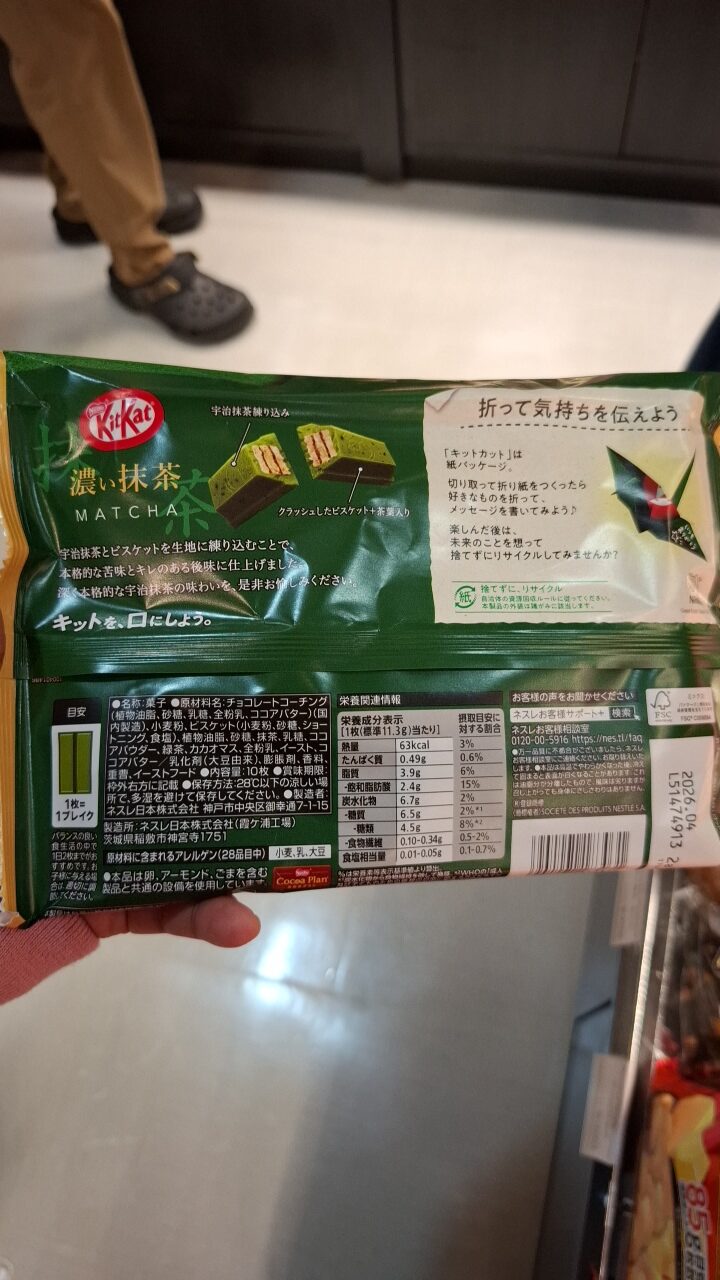
Barcode: 4902201183031
kitkat
HALAL
📝 Reason: Most ingredients in KitKat (chocolate, milk, wheat, sugar, etc.) are naturally Halal. However, ingredients such as ’emulsifier’, ‘flavoring’, and ‘flavor’ are doubtful because they may originate from animal sources or contain alcohol, and the exact source is not specified. In Islamic law, all ambiguous ingredients must be verified as Halal (Quran 5:3). When the source is unknown, classification must default to ‘Doubtful’ per IFANCA (www.ifanca.org).
🏷️ Category: Chocolate, Biscuit
📄 Certificates: Matcha, Fsc, Cocoa Plan, Vegetarisch
Ingredients:
Details
Exploring the Halal Status of KitKat
As a popular chocolate treat around the world, KitKat has garnered a significant following. However, for many consumers, understanding its Halal status is crucial. When it comes to compliance with Islamic dietary laws, the question arises: Is KitKat Halal? The answer is affirmative, but let’s dive deeper into the ingredients to understand why.
Halal Status Overview
KitKat is classified as Halal based on its ingredient composition. Most components in this product, such as chocolate, milk, wheat, and sugar, are naturally Halal. However, certain components like ’emulsifier’ and ‘flavoring’ can raise concerns due to their ambiguous origins. According to Islamic law, particularly verse 5:3 of the Quran, any ingredients of uncertain source should be regarded as doubtful.
Ingredient Breakdown
Here’s a detailed examination of the ingredients in KitKat and their respective Halal status:
- Chocolate Coating: Typically made from cocoa butter, cocoa mass, sugar, emulsifier, and milk. Halal if it is free from alcohol and animal fat. Refer to more about this here.
- Chocolate: Comprising cocoa, cocoa butter, sugar, and milk powder, chocolate is generally Halal unless it contains alcohol or animal-derived emulsifiers. More information can be found here.
- Vegetable Oil: Usually derived from plant sources like palm or soybean; it’s considered Halal unless processed with animal-based additives. Details here.
- Wheat Flour: A universal Halal ingredient directly sourced from wheat, ensuring no Haram elements.
- Biscuit: Made from wheat flour, sugar, and fats, biscuits are Halal unless they contain animal fats or substances derived from Haram sources. Learn more here.
- Sugar: Refined from cane or beet, sugar is Halal unless processed with bone char, which is rare.
- Shortening: Often plant-based, shortening can sometimes include animal fats. If it comes from vegetable sources, it’s Halal.
- Salt: Always Halal; this common mineral is used widely in foods.
- Matcha: Made from powdered green tea, matcha is completely plant-based and Halal.
- Milk Powder: Dehydrated cow’s milk is Halal if sourced solely from cows without animal rennet. More information here.
- Cocoa Butter: Extracted from cacao beans, it’s Halal as it is plant-based.
- Emulsifier: Can originate from either plant or animal sources, which makes it doubtful unless specified as Halal. Learn further here.
- Leavening Agent: Universally Halal, common types include baking powder and soda.
- Flavoring & Flavor: These ingredients are often suspect as they may include alcohol or animal-derived substances; their status is essentially doubtful without clarity. More details here.
- Yeast: Used for fermentation, yeast is considered Halal.
- Cocoa Mass: Derived from cocoa beans, it’s Halal.
- Whole Milk Powder: Similar to the previously mentioned milk powder; Halal as outlined.
Certification Context
KitKat’s Halal certification is an essential aspect for Muslim consumers. Certifications such as Matcha, FSC, Cocoa Plan, and Vegetarisch signify adherence not only to Halal standards but also potential ethical sourcing practices. Consumers should verify these certifications on the packaging to ensure compliance with their dietary requirements.
Conclusion
To summarize, KitKat is generally considered Halal due to its primary ingredients. However, due diligence regarding the emulsifiers and flavorings is recommended, as these remain ambiguous without specific sourcing declarations. For those adhering to a Halal lifestyle, it’s advisable to look for clear Halal certification to ensure compliance with Islamic dietary laws.
